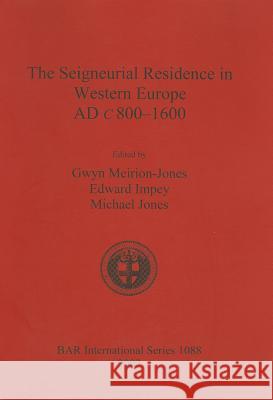The Seigneurial Residence in Western Europe AD c 800-1600 » książka
The Seigneurial Residence in Western Europe AD c 800-1600
ISBN-13: 9781841714660 / Angielski / Miękka / 2002 / 280 str.
In this volume's 18 chapters, divers authors utilizing a variety of techniques explore elements of seigneurial domestic buildings (AD c.800-600) on both sides of the English Channel. Among the contributors are scholars from as far afield as Germany, south-west France, Ireland, Scotland and the Channel Islands. They have provided a collection of papers which provides considerable insight into recent studies on the seigneurial domestic buildings of north-western Europe. Locations covered specifically include Norwich Castle, Boothby Pagnell, the Imperial Hall at Frankfurt am Main, Muenzenberg, and the turris famosa of Ivry-la-Bataille. Notwithstanding differences of emphasis and the considerable range of techniques demonstrated, this work may be divided into two main categories: thematic and regional studies; and monographs. The approach, broadly, of the authors has been to combine archaeology with a proper use of documentary sources. In a limited number of cases it has been posible also to make use of dendrochronology, thereby adding precision to the altogether more subjective stylistic dating so beloved by the art historian.
In this volume's 18 chapters, diverse authors utilizing a variety of techniques explore elements of seigneurial domestic buildings (AD c.800-1600) on both sides of the English Channel. Among the contributors are scholars from as far afield as Germany, south-west France, Ireland, Scotland and the Channel Islands. They have provided a collection of papers which provides considerable insight into recent studies on the seigneurial domestic buildings of north-western Europe. Locations covered specifically include Norwich Castle, Boothby Pagnell, the Imperial Hall at Frankfurt am Main, Muenzenberg, and the turris famosa of Ivry-la-Bataille. Notwithstanding differences of emphasis and the considerable range of techniques demonstrated, this work may be divided into two main categories: thematic and regional studies; and monographs. The approach, broadly, of the authors has been to combine archaeology with a proper use of documentary sources. In a limited number of cases it has been posible also to make use of dendrochronology, thereby adding precision to the altogether more subjective stylistic dating so beloved by the art historian.











